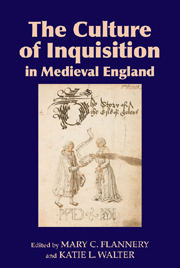Book contents
- Frontmatter
- Contents
- Illustrations
- List of Contributors
- Acknowledgements
- Abbreviations
- Introduction: Imagining Inquisition
- 1 Inquisition, Public Fame and Confession: General Rules and English Practice
- 2 The Imperatives of Denunciatio: Disclosing Others' Sins to Disciplinary Authorities
- 3 English Provincial Constitutions and Inquisition into Lollardy
- 4 The Contest over the Public Imagination of Inquisition, 1380–1430
- 5 ‘Vttirli Onknowe’? Modes of Inquiry and the Dynamics of Interiority in Vernacular Literature
- 6 From Defacement to Restoration: Inquisition, Confession and Thomas Usk's Appeal and Testament of Love
- 7 Confession, Inquisition and Exemplarity in The Erle of Tolous and Other Middle English Romances
- 8 Heresy Inquisition and Authorship, 1400–1560
- 9 Imitating Inquisition: Dialectical Bias in Protestant Prison Writings
- 10 Response Essay: Chaucer's Inquisition
- Bibliography
- Index
7 - Confession, Inquisition and Exemplarity in The Erle of Tolous and Other Middle English Romances
Published online by Cambridge University Press: 05 April 2013
- Frontmatter
- Contents
- Illustrations
- List of Contributors
- Acknowledgements
- Abbreviations
- Introduction: Imagining Inquisition
- 1 Inquisition, Public Fame and Confession: General Rules and English Practice
- 2 The Imperatives of Denunciatio: Disclosing Others' Sins to Disciplinary Authorities
- 3 English Provincial Constitutions and Inquisition into Lollardy
- 4 The Contest over the Public Imagination of Inquisition, 1380–1430
- 5 ‘Vttirli Onknowe’? Modes of Inquiry and the Dynamics of Interiority in Vernacular Literature
- 6 From Defacement to Restoration: Inquisition, Confession and Thomas Usk's Appeal and Testament of Love
- 7 Confession, Inquisition and Exemplarity in The Erle of Tolous and Other Middle English Romances
- 8 Heresy Inquisition and Authorship, 1400–1560
- 9 Imitating Inquisition: Dialectical Bias in Protestant Prison Writings
- 10 Response Essay: Chaucer's Inquisition
- Bibliography
- Index
Summary
Taak fyr and ber it in the derkeste hous
Bitwix this and the mount of Kaukasous,
And lat men shette the dores and go thenne;
Yet wole the fyr as faire lye and brenne
As twenty thousand men myghte it biholde.
Geoffrey Chaucer, ‘The Wife of Bath's Tale’ (III.1139–43)The ‘self’ as we now know it is often said to have emerged in the Renaissance (Foucault, in fact, tended to focus on the eighteenth century), but there is a serious claim for marking this emergence at the moment when confession has exceeded its religious brief and is no longer illustrated by, but fully absorbed to, the process of narrative.
Christopher Cannon, Middle English LiteratureTo say that an ethos of inquisition gained deep cultural saturation in late-medieval England is to beg the question of where, and in what form, we find engagements with this phenomenon in the artefacts of medieval cultural production. This essay takes romance, the dominant form of popular fiction in the period, as one of the more prevalent of such cultural artefacts, and it interrogates these texts as witnesses to, and manifestations of, the cultural embeddedness of inquisitio in the period. While the following discussion looks broadly at generic trends, the principal focus here is an English tail-rhyme romance of the late fourteenth century, The Erle of Tolous.
- Type
- Chapter
- Information
- The Culture of Inquisition in Medieval England , pp. 112 - 129Publisher: Boydell & BrewerPrint publication year: 2013



